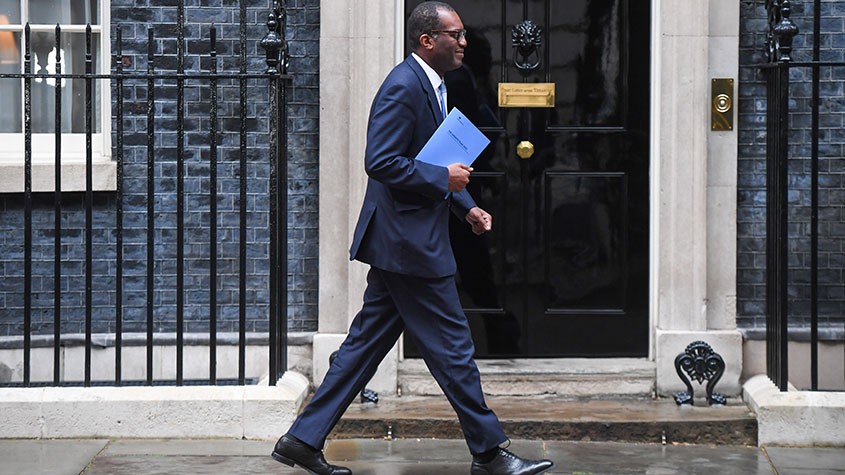Tax changes: here is what the mini-Budget means for you
Saloni Sardana looks at the tax cuts in the mini-Budget and explains what each one means.


Get the latest financial news, insights and expert analysis from our award-winning MoneyWeek team, to help you understand what really matters when it comes to your finances.
You are now subscribed
Your newsletter sign-up was successful
Want to add more newsletters?

Twice daily
MoneyWeek
Get the latest financial news, insights and expert analysis from our award-winning MoneyWeek team, to help you understand what really matters when it comes to your finances.

Four times a week
Look After My Bills
Sign up to our free money-saving newsletter, filled with the latest news and expert advice to help you find the best tips and deals for managing your bills. Start saving today!
Today’s mini-Budget was all about taxes. The new chancellor, Kwasi Karteng, announced that the government will scrap the 45p top rate of income tax, leaving a top band of 40p. The move took many by surprise and was one of the biggest treats handed out by the chancellor.
What else did the chancellor announce on taxes?
Changes to income tax
Apart from abolishing the 45% income-tax band, the chancellor also announced a cut in the basic rate of income tax. From April 2023, the basic rate will be cut by a penny in the pound to 19%.
MoneyWeek
Subscribe to MoneyWeek today and get your first six magazine issues absolutely FREE

Sign up to Money Morning
Don't miss the latest investment and personal finances news, market analysis, plus money-saving tips with our free twice-daily newsletter
Don't miss the latest investment and personal finances news, market analysis, plus money-saving tips with our free twice-daily newsletter
“The decision to scrap the 45p rate of income tax, which affects 629,000 people who earn more than £150,000 a year, is potentially politically explosive,” says The Times.
It will stir controversy with Labour who will argue that it benefits the rich when many Britons are grappling with a cost of living crisis.
However, the Tories argue that it will foster greater investment in the UK.
National Insurance
The chancellor reiterated changes to National Insurance that were announced on Thursday ahead of the mini-Budget.
The 1.25% percentage-point increase in National Insurance contributions, introduced by former chancellor Rishi Sunak, will be reversed on 6 November.
The government will also cancel the planned health and social care levy, a separate tax which was expected to come into force April 2023.
Stamp duty
As widely anticipated, the chancellor announced changes to stamp duty. He increased the threshold at which home-buyers must pay stamp duty from £125,000 to £250,000 and onwards.
First-time buyers will only start paying stamp duty on properties valued at more than £425,000, up from the previous threshold of £300,000.
And in more good news, the value of property on which first-time buyers can claim tax relief increased from £500,000 to £625,000.
Corporation tax and investment zones
Kwarteng confirmed that he is scrapping next year’s planned rise in corporation tax, which was due to rise to 25%. Corporation tax will remain at 19%.
He estimates the move will put roughly £19bn back into the economy and will leave the UK with one of the lowest corporation tax rates in the G20.
The government will also be setting up new investment zones across the UK, which will benefit from lower taxes, simpler planning regimes, increased funding, zero-rate NI employer contributions for certain employees, and stamp duty land tax relief.
VCTs, EIS and SEIS
The government announced that Venture Capital Trusts (VCT), the Enterprise Investment Scheme (EIS) and the Seed Enterprise Investment Scheme (SEIS) will be protected beyond 2025.
EIS is an investment scheme which allows private investors to generate tax savings by investing in growth businesses.
The amount of money businesses can raise via the SEIS rose from £150,000 to £250,000 and the maximum age of the business raising capital increased to three years.
What does this mean for you?
For pensions, the budget is both good and bad news.
As Helen Morrissey, senior pensions analyst at Hargreaves Lansdown, points out: “Both annuities and drawdown are subject to income tax, so this will be a shot in the arm for pensioners.”
She adds that while the 1% cut may sound small it can generate decent savings, with someone on “£25,000 income paying over £125 less per year” and basic-rate taxpayers will be happy to pay less in taxes. She cautioned that these changes don’t kick in immediately.
“By that point, pensioners waiting for their state pension to be uprated with inflation may well be running on empty,” she said.
Tax relief for basic-rate taxpayers saving into their pensions is going to be less generous, she says, but pensions remain a very tax-efficient way to save.
“All contributions are completely tax free”, she adds. “The fact that workplace pensions receive tax relief and a contribution from your employer still make them incredibly powerful places to save for the future,”
Will the stamp duty cut drive house prices higher?
According to Rightmove the changes to stamp duty could increase UK house prices.
Rightmove’s housing expert Tim Bannister said: “Demand has been softening over the last few months but today’s announcement is likely to stimulate some more demand. If it does lead to a big jump in prospective buyers competing for the constrained number of properties for sale then it could lead to some unseasonal price rises over the next few months.”
But Bannister expects the increase in UK house prices to not be as drastic as those announced during the temporary stamp duty holiday in 2020 as the stamp duty change is permanent.
But Sarah Coles, senior personal finance analyst at Hargreaves Lansdown, points out that the biggest issue with the UK housing market is lack of supply, as most agents only have 36 properties at hand, which she argues this mini-budget did not address.
“Higher prices coupled with higher mortgage rates are going to push properties further out of reach for millions of people, which could in itself end up scuppering sales. The property market is a delicate beast, and tinkering with tax incentives always risks,” she warns.
What could be more significant for house prices, however, could be the rise in interest rates. One of the principal reasons houses are so expensive is the years of ultra-low interest rates – if homebuyers are able borrow more money at lower rates, the price of houses goes up. But with interest rates now rising steadily, we could see house prices fall, with London leading the decline.
What does this mean for businesses?
For businesses the cut in corporation tax will be welcome.
“While the planned hike in corporation tax from 19% to 25% has been consigned to the bin, while 'Investment Zones' in England, with specific tax cuts and liberalised planning rules, have been announced. The case for making tax cuts now is that they could stimulate greater consumer spending and encourage more investment in UK businesses,” says Myron Jobson, senior analyst at Interactive Investor.
Many experts welcomed the changes to EIS and said it would benefit businesses.
Simon Emary, COO of Growthdeck, comments: “The Chancellor’s decision to back EIS and SEIS is a shot in the arm for growth businesses in the UK and for the economy overall.”“EIS has been a huge net positive for the economy and the tax base over the last 28 years. It has helped many thousands of businesses to grow and created a vast number of jobs.”
“Enabling SEIS to do more to get funding to smaller scale businesses is another big positive. A lot of people in the investment industry have long felt that its impact has been limited by the restrictive cap on the size of investment people can make through it. It’s good to see the government take a step toward improving that,” he added.
Get the latest financial news, insights and expert analysis from our award-winning MoneyWeek team, to help you understand what really matters when it comes to your finances.
Saloni is a web writer for MoneyWeek focusing on personal finance and global financial markets. Her work has appeared in FTAdviser (part of the Financial Times), Business Insider and City A.M, among other publications. She holds a masters in international journalism from City, University of London.
Follow her on Twitter at @sardana_saloni
-
 Should you buy an active ETF?
Should you buy an active ETF?ETFs are often mischaracterised as passive products, but they can be a convenient way to add active management to your portfolio
-
 Power up your pension before 5 April – easy ways to save before the tax year end
Power up your pension before 5 April – easy ways to save before the tax year endWith the end of the tax year looming, pension savers currently have a window to review and maximise what’s going into their retirement funds – we look at how
-
 Conservatives pledge to cut National Insurance again – how much could you save?
Conservatives pledge to cut National Insurance again – how much could you save?News A 2p reduction in National Insurance is a key feature of the Tory’s general election manifesto.
-
 UK wages grow at a record pace
UK wages grow at a record paceThe latest UK wages data will add pressure on the BoE to push interest rates even higher.
-
 Trapped in a time of zombie government
Trapped in a time of zombie governmentIt’s not just companies that are eking out an existence, says Max King. The state is in the twilight zone too.
-
 America is in deep denial over debt
America is in deep denial over debtThe downgrade in America’s credit rating was much criticised by the US government, says Alex Rankine. But was it a long time coming?
-
 UK economy avoids stagnation with surprise growth
UK economy avoids stagnation with surprise growthGross domestic product increased by 0.2% in the second quarter and by 0.5% in June
-
 Bank of England raises interest rates to 5.25%
Bank of England raises interest rates to 5.25%The Bank has hiked rates from 5% to 5.25%, marking the 14th increase in a row. We explain what it means for savers and homeowners - and whether more rate rises are on the horizon
-
 UK inflation remains at 8.7% ‒ what it means for your money
UK inflation remains at 8.7% ‒ what it means for your moneyInflation was unmoved at 8.7% in the 12 months to May. What does this ‘sticky’ rate of inflation mean for your money?
-
 Would a food price cap actually work?
Would a food price cap actually work?Analysis The government is discussing plans to cap the prices of essentials. But could this intervention do more harm than good?
